Israel is reeling under collective shock because of its tendency to pay close attention to analyses of Israel and its supporters — while largely neglecting the Palestinian viewpoint, writes Ramzy Baroud.
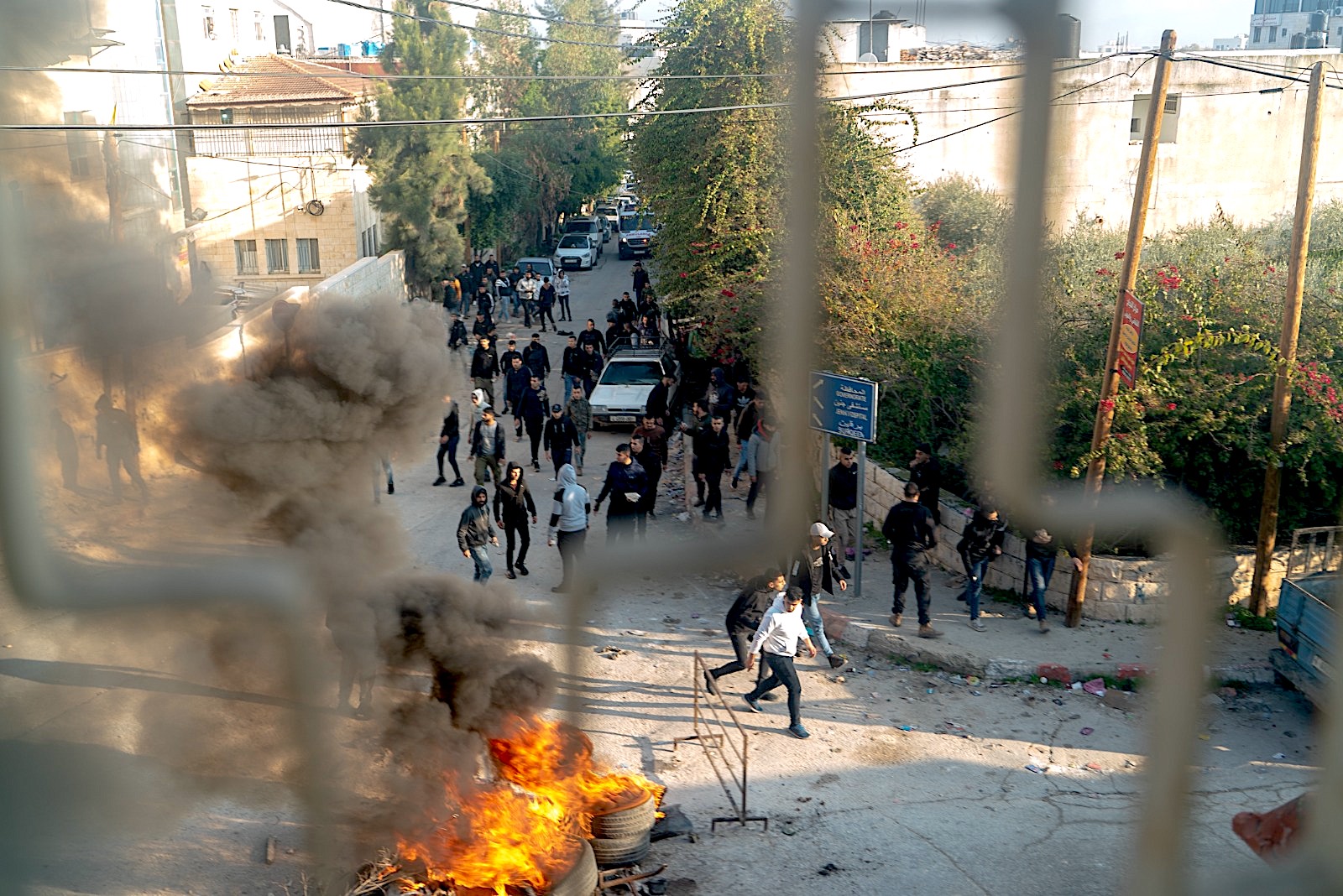
IDF raid in Jenin refugee camp in the occupied West Bank in January 2023. (IDF Spokesperson’s Unit, Wikimedia Commons, CC BY-SA 3.0)
By Ramzy Baroud
MintPress News
 The dramatic, earth-shattering events in Palestine starting on Oct. 7 have taken many people by surprise. However, attentive observers were not among them.
The dramatic, earth-shattering events in Palestine starting on Oct. 7 have taken many people by surprise. However, attentive observers were not among them.
Few expected that Palestinian fighters would be parachuting into southern Israel on Oct. 7; that instead of capturing a single Israeli soldier — as done in 2006 — hundreds of Israelis, including many soldiers and civilians, would find themselves captive in besieged Gaza.
The reason behind the “surprise,” however, is the same reason that Israel is still reeling under collective shock, which is the tendency to pay close attention to political discourses and intelligence analyses of Israel and its supporters — while largely neglecting the Palestinian discourse.
For better comprehension, let us go back to the start.
The Spark
We entered 2023 with some depressing data and dark predictions about what was awaiting Palestinians in the new year.
Just before the year commenced, the United Nations Mideast envoy, Tor Wennesland, said 2022 was the most violent year since 2005. “Too many people, overwhelmingly Palestinian, have been killed and injured,” Wennesland told the U.N. Security Council.
This figure — 171 killed and hundreds wounded in the West Bank alone — did not receive much coverage in Western media. The mounting number of Palestinian victims, however, registered among Palestinians and their Resistance movements.
As anger and calls for revenge grew among ordinary Palestinians, their leadership continued to play its same traditional role — of pacifying Palestinian calls for resistance while continuing with its ‘security coordination’ with Israel.
Palestinian Authority President Mahmoud Abbas, 88, carried on rehashing the old language about a two-state solution and the “peace process” while cracking down on Palestinians who dared protest his ineffectual leadership.
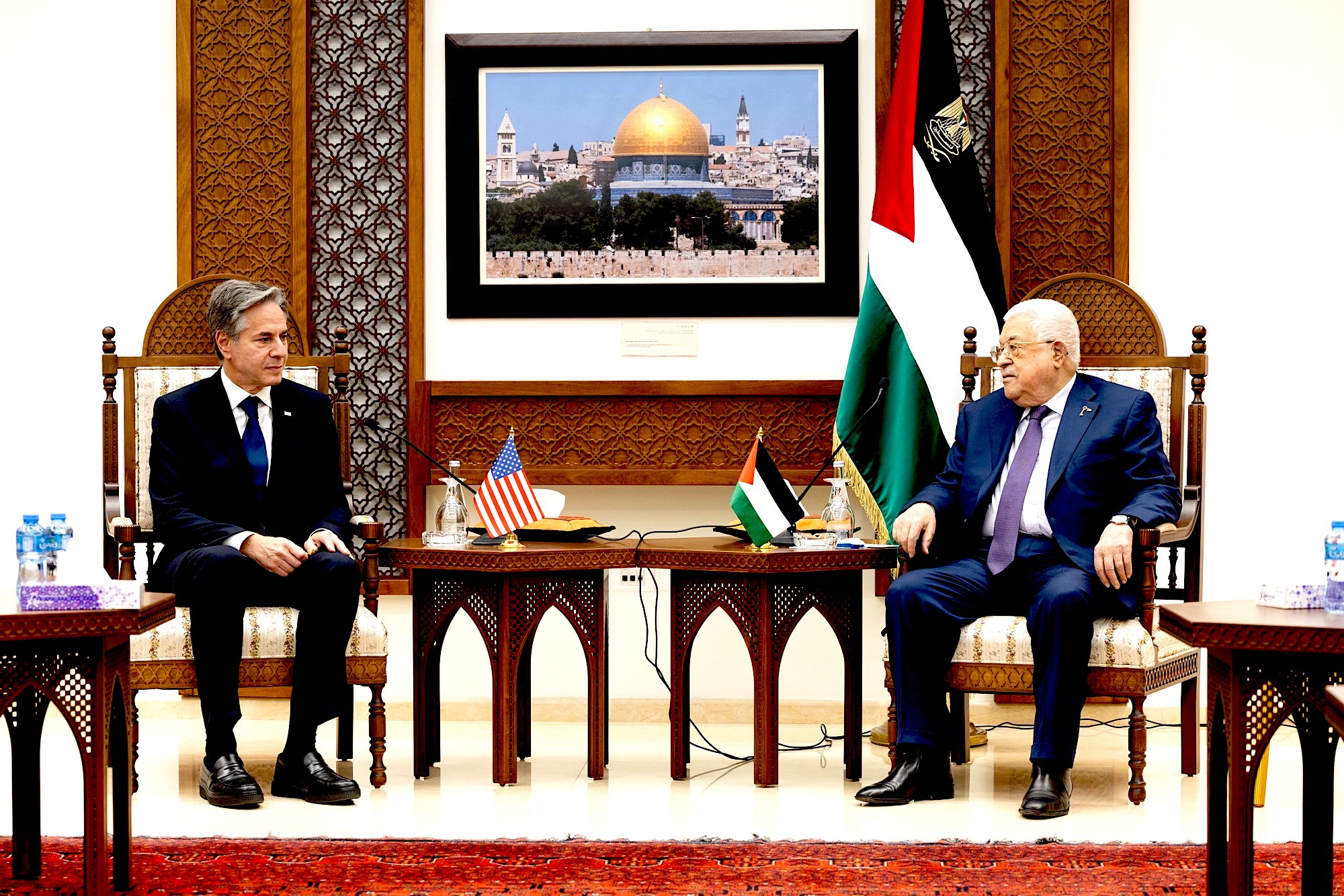
U.S. Secretary of State Antony Blinken with Abbas at the Muqata in Ramallah, West Bank, Nov. 5, 2023. (State Department, Chuck Kennedy)
Defenseless in the face of a far-right Israeli government with an open agenda to crush Palestinians, to expand illegal settlements and to prevent the establishment of a Palestinian state, Palestinians were forced to develop their defensive strategies.
The Lions’ Den — a multi-factional Resistance group that first appeared in Nablus in August 2022 — grew in power and appeal. Other groups, old and new, emerged on the scene throughout the northern West Bank, with the single objective of uniting Palestinians around a non-factional agenda and, ultimately, producing a new Palestinian leadership in the West Bank.
These developments sounded alarm bells in Israel. The Israeli occupation army moved quickly to crush the new armed rebellion, raiding Palestinian towns and refugee camps one after the other, with the hope of turning this nascent revolution into another failed attempt to challenge the status quo in occupied Palestine.
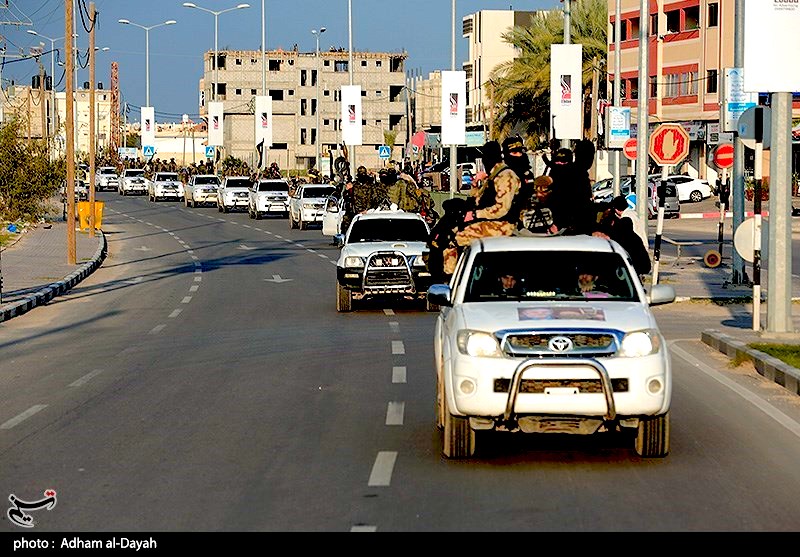
Al-Quds Brigades weapons exhibition, Gaza Strip, Jan. 7, 2022. (Tasnim News Agency, Wikimedia Commons, CC BY 4.0)
The bloodiest of the Israeli incursions occurred in Nablus on Feb. 23, Jericho on August 15 and, most importantly, in the Jenin refugee camp.
The July 3 Israeli invasion of Jenin was reminiscent, in terms of casualties and degree of destruction, of the Israeli invasion of that very camp in April 2002.
The outcome, however, was not the same. Back then, Israel had invaded Jenin, along with other Palestinian towns and refugee camps, and succeeded in crushing armed resistance for years to come.
This time around, the Israeli invasion merely ignited a broader rebellion in the Occupied Palestinian Territories, creating a further schism in the already deteriorating relationship between Palestinians, on the one hand, and Abbas and his Palestinian Authority, on the other.
[See: Resistance in Jenin]
Indeed, just days after Israel concluded its attack on the camp, Abbas emerged with thousands of his soldiers to warn the bereaved refugees that “the hand that will break the unity of the people .. will be cut off from its arm.”
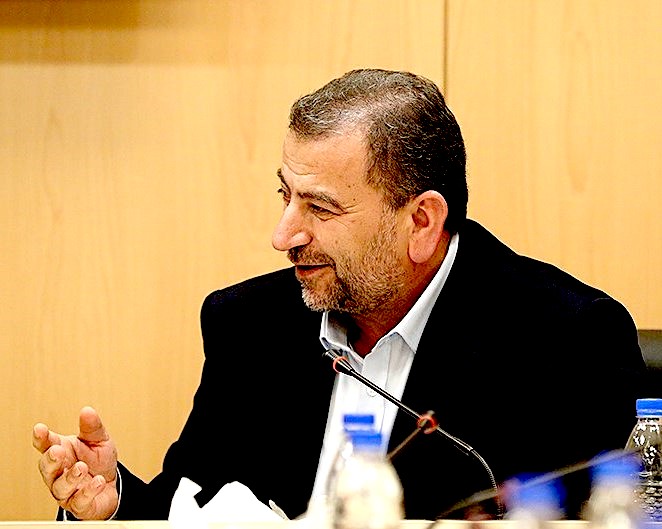
Hamas’ Saleh al-Arouri in 2017. (Tasnim News Agency, Wikimedia Commons, CC BY 4.0)
Yet, as the popular rebellion continued to build momentum in the West Bank, Israeli intelligence reports started talking about a plan composed by the deputy head of Hamas’ political bureau, Saleh Arouri, [who was killed on Jan. 2 by Israeli forces] to ignite an armed Intifada.
The solution, according to the Israeli newspaper Yedioth Ahronoth, citing official Israeli sources, was to kill Arouri.
Indeed, Israel’s attention and counterstrategy were focused intently on the West Bank, as Hamas, in Gaza at the time, in Israel’s viewpoint, seemed disinterested in an all-out confrontation.
But why did Israel reach such a conclusion?
Miscalculation
Several significant events, the kind that would have pushed Hamas to retaliate, have taken place without any severe armed response by the Resistance in Gaza.
Last December, Israel had sworn in its most right-wing government in history. Far-right ministers Itamar Ben-Gvir and Bezalel Smotrich arrived on the political scene with the declared objectives of annexing the West Bank, imposing military control over Al-Aqsa Mosque and other Palestinian Muslim and Christian holy sites and, in the case of Smotrich, denying the very existence of the Palestinian people.
Their pledges were quickly translated into action under the leadership of Israeli Prime Minister Benjamin Netanyahu. Ben-Gvir was keen on sending a message to his constituency that the seizure of Al-Aqsa Mosque by Israel had become imminent.
He repeatedly raided or ordered raids on Al-Aqsa at an unprecedented frequency. The most violent and humiliating of these raids occurred on April 4, when worshippers were beaten up by soldiers while praying inside the mosque during the holy month of Ramadan.
Grotesque! Israeli troops invade al Aqsa Mosque & beat Palestinians. There’s no justification for this violation. It’s their mosque. Israel has no right to violate their rights or the sanctity of the place. pic.twitter.com/YQ7z8JuF8H
— James J. Zogby (@jjz1600) April 5, 2023
Resistance groups in Gaza threatened retaliation. Several rockets were fired from Gaza toward Israel, merely serving as a symbolic reminder that Palestinians are united, regardless of where they are in the geographic map of historic Palestine.
Israel, however, ignored the message and used the Palestinian threats of retaliation and the occasional ‘lone-wolf attacks’ — like that of Muhannad al-Mazaraa at the illegal Maale Adumim settlement — as political capital to ignite the religious fervor of Israeli society.
Not even the death of Palestinian political prisoner Khader Adnan on May 2 seemed to have shifted Hamas’ position. Some even suggested that there is a rift between Hamas and the Palestinian Islamic Jihad following Adnan’s death as a result of a hunger strike in the Ramleh Prison.
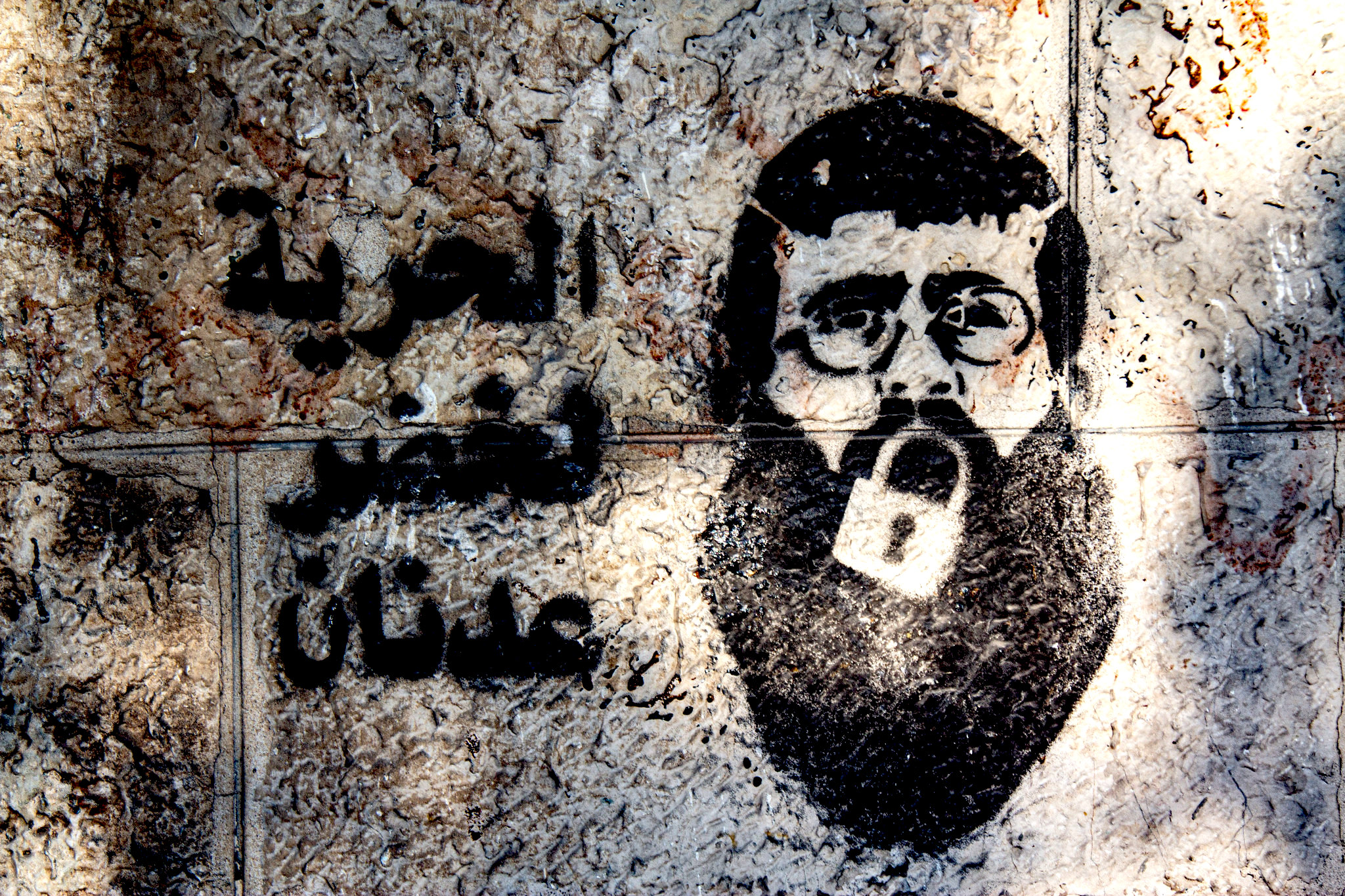
Stencil of Khadar Adnan, a Palestinian political prisoner, with padlocked lips in Ramallah, November 2021. The Arabic text translates “Adnan is a guardian of freedom.” (Philip Hopper, Flickr, CC BY 2.0)
On the same day, the PIJ fired rockets into Israel, as Adnan was one of its most prominent members. Israel answered by attacking hundreds of targets inside Gaza, mostly civilian homes and infrastructure, which resulted in the death of 33 Palestinians and the wounding of 147 more.
A truce was declared on May 13, again with no direct Hamas participation, giving further reassurance to Israel that its bloody onslaught on the Strip had achieved more than a military purpose – often referred to as ‘mowing the lawn’ – but a political one, as well.
Israel’s strategic estimation, however, proved to be wrong, as attested by Hamas’ well-coordinated Oct. 7 attacks in southern Israel, targeting numerous military bases, settlements and other strategic positions.
But was Hamas being deceptive? Hiding its actual strategic objectives in anticipation of that significant event?
‘Roaring Flood’
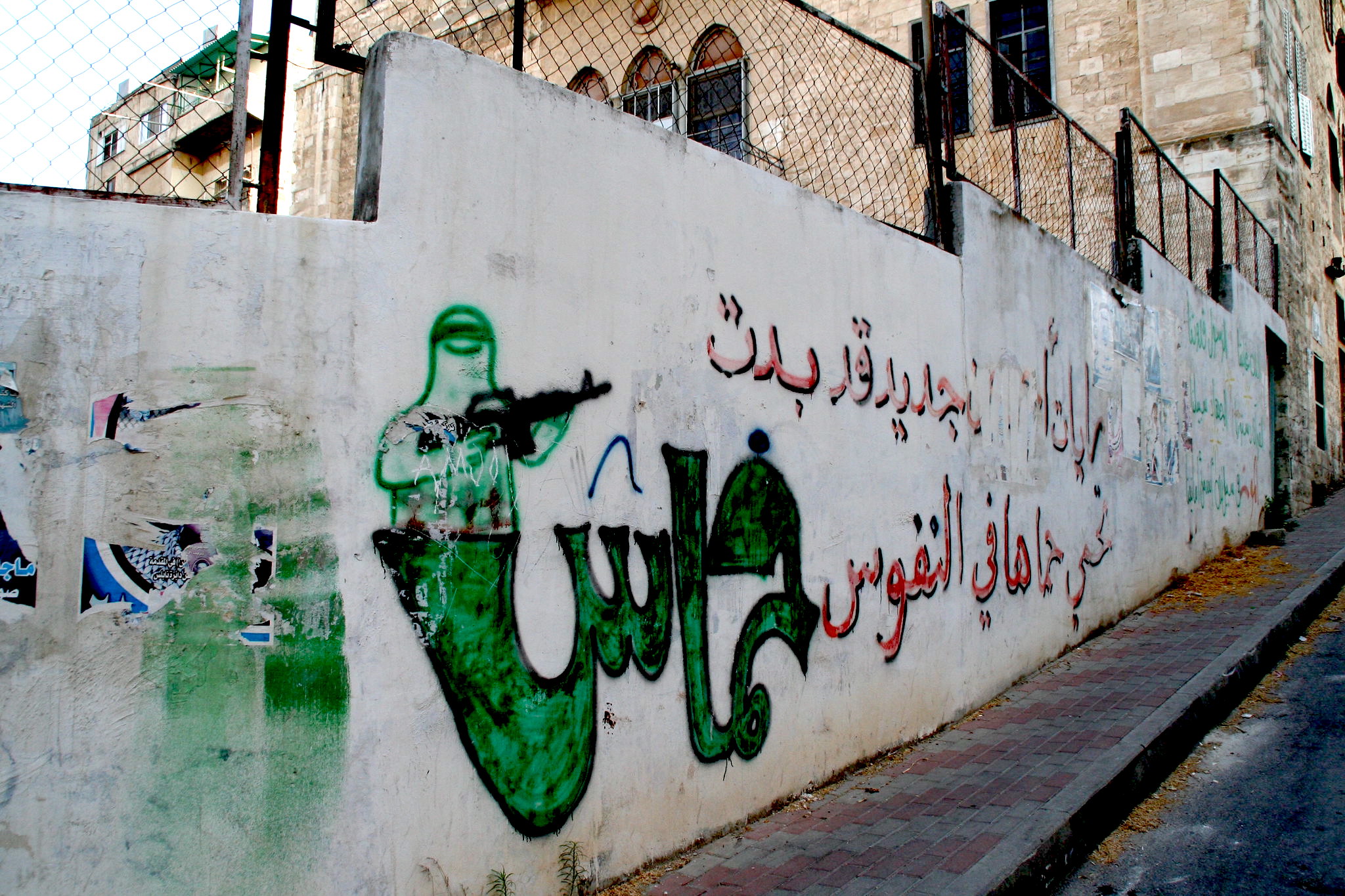
Graffiti in Nablus in 2006 says “Hamas” and has the image of an armed fighter. (Michael loadenthal, Flickr, CC BY-NC-SA 2.0)
A quick examination of Hamas’ recent statements and political discourse demonstrates that the Palestinian group was hardly secretive about its future actions.
Two weeks before 2023 commenced, at a Gaza rally on Dec. 14, Hamas leader in Gaza, Yahya Sinwar, had a message for Israel:
“We will come to you in a roaring flood. We will come to you with endless rockets; we will come to you in a limitless flood of soldiers … like the repeating tide.”
The immediate response to the Hamas’ attack was the predictable U.S.-Western solidarity with Israel, calls for revenge, the destruction and annihilation of Gaza and the revitalized plans of displacing Palestinians out of Gaza into Egypt – in fact, out of the West Bank as well, into Jordan.
The Israeli war on the Strip, also starting on Oct. 7, has resulted in unprecedented casualties compared to all Israeli wars on Gaza, in fact, on Palestinians during any time in modern history.
Quickly, the term “genocide” was being used, initially by intellectuals and activists and eventually by international law experts.
“Israel’s genocidal assault on Gaza is quite explicit, open, and unashamed,” associate professor of Holocaust and genocide studies at Stockton University, Raz Segal, wrote on Oct. 13 in an article entitled “A Textbook Case of Genocide.”
Despite this, the U.N. could do nothing. Secretary-General Antonio Guterres said on Nov. 8 that the U.N. has “neither money nor power” to prevent a potential genocide in Gaza.
In essence, this effectively meant the disabling of the international legal and political systems, as every attempt by the Security Council to demand an immediate and permanent ceasefire has been blocked by the U.S. and Israel’s other Western allies.
As the death toll mounted among a starving population in Gaza — all food deprived per the Nov. 28 estimation of the World Food Program — Palestinians resisted throughout the Gaza Strip.
Their resistance was not only confined to attacking or ambushing invading Israeli soldiers but was predicated on the legendary steadfastness of a population that refused to be weakened or displaced.
Sumud

Palestinians in the aftermath of an Israeli airstrike on the El-Remal aera in Gaza City on Oct. 9, 2023. (Naaman Omar, Palestinian News & Information Agency, or Wafa, for APAimages, Wikimedia Commons, CC BY-SA 3.0)
This sumud (steadfast perseverance) continued, even when Israel began to systematically attack hospitals, schools, and every place that, in times of war, is seen as ‘safe places’ for a beleaguered civilian population.
Indeed, on Dec. 3, UN Human Rights Chief Volker Türk said that “there is no safe place in Gaza.” This phrase was repeated often by other U.N. officials, along with other phrases such as “Gaza has become a graveyard for children,” as first noted by UNICEF Spokesperson James Elder on Oct. 31.
This left Guterres with no other option but to, on Dec. 6, invoke article 99, which allows the secretary-general to “bring to the attention of the Security Council any matter which in his opinion may threaten the maintenance of international peace and security.”
Israeli violence and Palestinian sumud also extended to the West Bank as well. Aware of the potential for armed resistance in the West Bank, the Israeli army quickly launched major, deadly raids on countless Palestinian towns, villages, and refugee camps, killing hundreds, injuring thousands, and arresting thousands more.
But Gaza remained the epicenter of the Israeli genocide. Aside from a brief humanitarian truce from Nov. 24 to Dec. 1, coupled with few prisoner exchanges, the battle for Gaza — for the future of Palestine and the Palestinian people — continues at an unparalleled price of death and destruction.
Palestinians know full well that the current fight will either mean a new Nakba, like the ethnic cleansing of 1948, or the beginning of the reversal of that very Nakba — as in the process of liberating the Palestinian people from the yoke of Israeli colonialism.
While Israel is determined to end Palestinian Resistance once and for all, it is evident that the Palestinian people’s determination to win their freedom in the coming years is far greater.
Dr. Ramzy Baroud is a journalist, author and the Editor of The Palestine Chronicle. He is the author of six books. His latest book, co-edited with Ilan Pappé, is Our Vision for Liberation: Engaged Palestinian Leaders and Intellectuals Speak Out. His other books include My Father Was a Freedom Fighter and The Last Earth. Baroud is a non-resident senior research fellow at the Center for Islam and Global Affairs (CIGA). His website is www.ramzybaroud.net
This article is from MintPress News, an award winning investigative newsroom. Sign up for their newsletter.
Views expressed in this article and may or may not reflect those of Consortium News.
Please DONATE to CN’S Winter Fund Drive



The Road to Another Fiasco 2013-23 – Francis Lee 2024.
It could be plausibly argued that historical conflicts which are entered into in high spirits often find themselves in unenviable outcomes which often end in disaster. The present Ukrainian debacle is a case in point.
Back in 2014 the printing presses are at work.
‘’American involvement was running hot and enthusiastic with headlines such as in a cold war echo of Obama’s Strategy Mr Baker writes of Putin (2014).’’
Such prophetic assessments echoed the US intelligence report in 1994; this warned that such reasonable divisions between Ukraine and the Russians would lead to an unenviable outcome. Regardless, two months after the 2008 memo, NATO summit was held in Bucharest where it was agreed that the 2 applicant states, (Ukraine and Georgia) will become members of NATO. This was something of a faux pas, to say the least. Ukraine and Georgia did not achieve the status they so dearly sought, but both were disappointed– such is the nature of politics.
But hey, Ukraine at least offered a more tempting target for American foreign policy; however, this didn’t come without a price. The circus of right-wing, political chancers in addition to ultra-right head cases – viz: Right Sector, Azov Battalion, Tornado Battalion, and so forth might well become a rather incumbent problem for the Americans.
Then came the ‘offensive’ carried out by the regular Ukrainian Army and the irregulars. The ‘offensive’ however ran into big problems – namely of being routed at the battles against the Don Bass Militias at Ilovaisk and Debaltsevo in 2015. Sorry chaps better try next time. Whoops! ran into the Russian Army proper.
And basically, that was it … Next time baby, but I wouldn’t put the kettle on yet.
Four percent of Gaza’s population is now injured or dead, a reprehensible figure that speaks to the level of depravity the Jewish supremacists in Israel will lower themselves to in order to ethnically cleanse Gaza because of their paranoid delusions, idiotic religious hubris, and land confiscation projects.
That otherwise intelligent and knowledgeable American scribes, pundits, journalists, intellectuals, academics, and media talking heads remain silent or issue only lazy and weak criticisms against “both sides” is beyond the pale and speaks to a self-serving cowardice that knows no bounds.
How do these immoral sick monsters sleep at night? It’s an honest question. Yes, they’re getting paid handsomely to watch Palestinian children in crowded and filthy emergency rooms be operated on without anesthetic as surgeons cut into their young arms, legs, bellies, faces, and genitalia to repair gaping and ghastly wounds the Jew supremacists inflicted with U.S. supplied weapons, but isn’t there a limit to how debased even the most greedy and sociopathic fiend can drop to?
Apparently not in Israhell’s or in the case of it’s western accomplices and allies.
Very well put, thank you. Racism combined with delusions of grandeur seems to be affecting most of the Israeli population as slaughter, immense pain and hunger is carried out in an unprecedented level.
“…Israel is determined to end Palestinian Resistance once and for all, …”
I think it would be more accurate to say that Israel is determined to end Palestinians once and for all